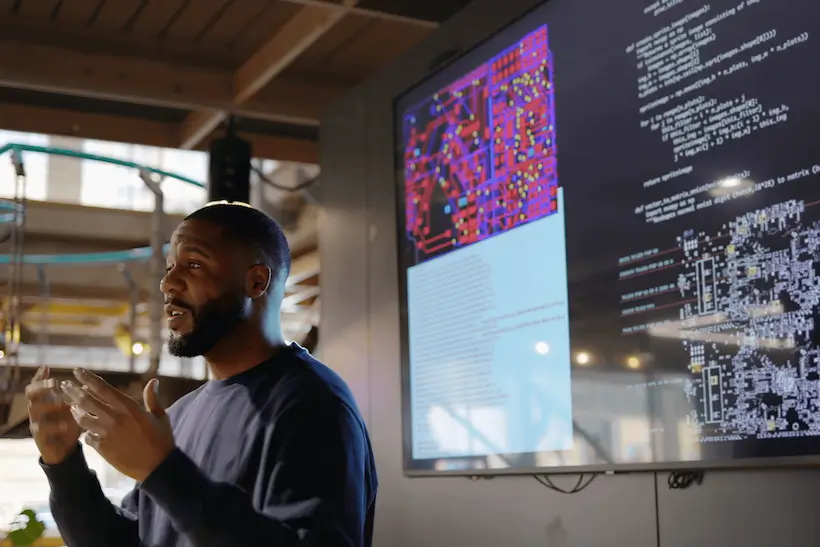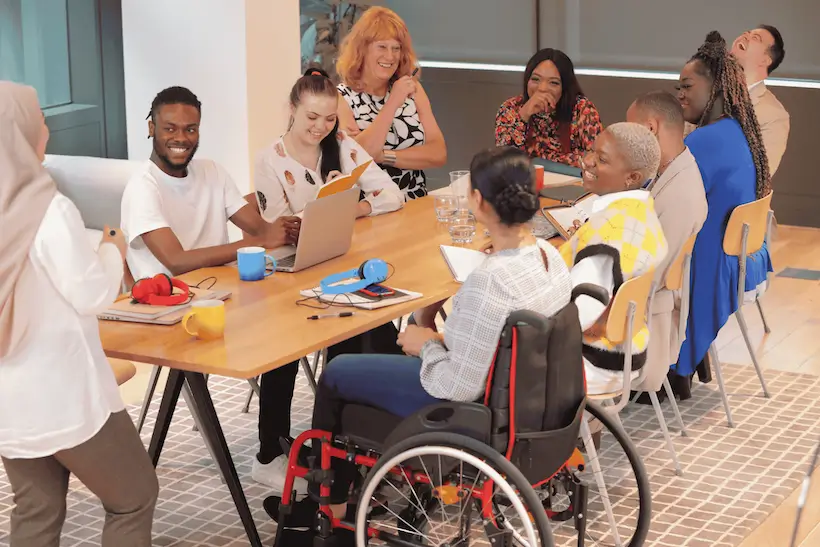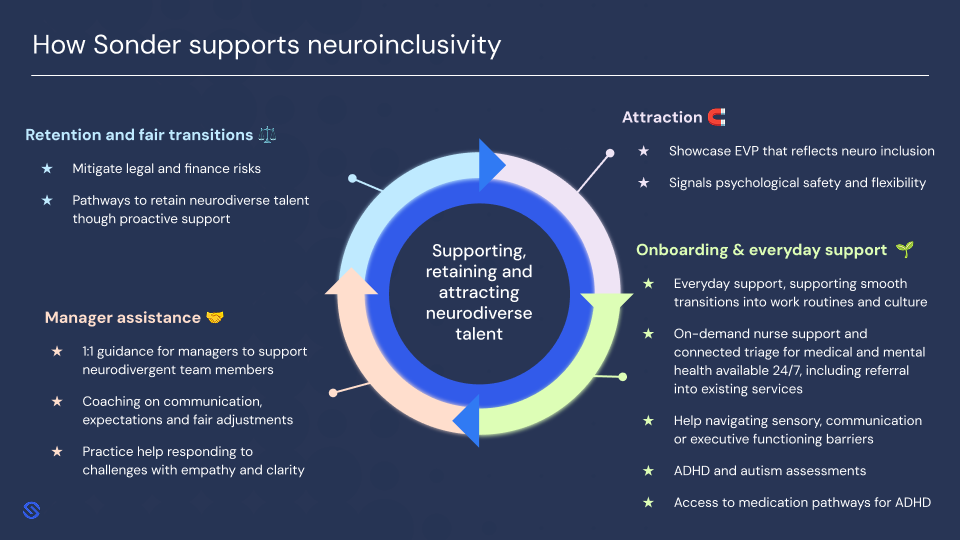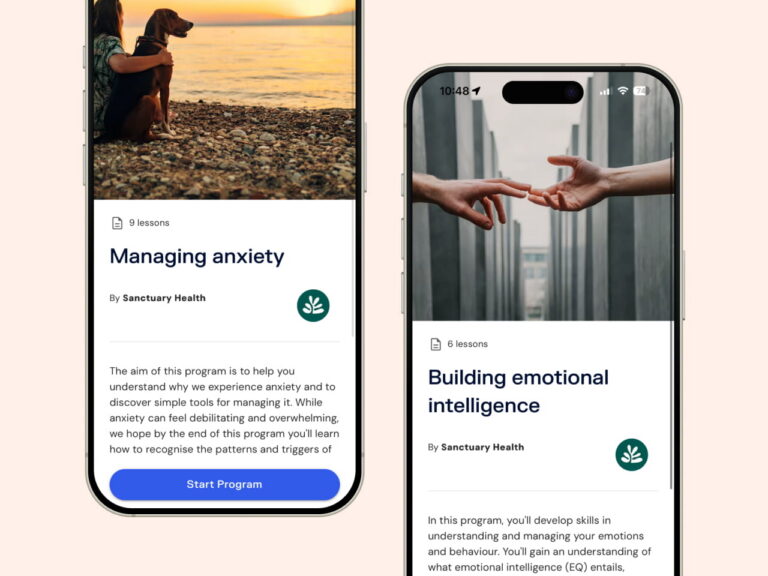At a glance:
- Inclusive by design: Small environmental adjustments, such as quiet zones, written meeting agendas and flexible start times, improve the working experience for everyone, not just the neurodivergent.
- The UK landscape: 15%–20% of the UK workforce is neurodivergent, yet only 32% feel comfortable disclosing their condition at work due to fear of stigma.
- The productivity advantage: Diverse thinking styles, including autism, ADHD and dyslexia, can drive a 30% increase in team productivity when supported by inclusive design.
- Reducing the “masking” tax: Workplace masking consumes significant cognitive energy; shifting to outcome-based performance metrics allows neurodivergent talent to focus on results over social conformity.
While British headlines dominate with concerns about the UK’s economic productivity and labour shortages, around one in five people—nearly 15 million individuals—represent an extraordinary untapped resource. These are the UK’s neurodivergent population: people whose brains are wired differently, bringing unique perspectives and remarkable abilities that could transform how we work.
The numbers tell a stark story. Only 21.7% of autistic people are in employment, while 30-40% of neurodivergent people remain unemployed. This isn’t just a missed opportunity for individuals, it’s a significant loss for businesses struggling with skills shortages and innovation challenges.
But change is happening. Job postings mentioning neurodiversity have nearly quadrupled in recent years, and forward-thinking employers are discovering what research consistently shows: over 80% of neurodivergent employees demonstrate exceptional focus, while 78% bring enhanced creativity to their roles.
The gap between intention and action remains wide, though. Despite growing awareness, 65% of neurodivergent employees still fear discrimination, and only 32% feel comfortable disclosing their condition at work. Many organisations want to be more inclusive but don’t know where to start.
This guide provides practical, evidence-based strategies for UK employers ready to tap into neurodivergent talent. We’ll explore what neurodivergence looks like in the workplace, the benefits of neuroinclusive hiring, and how to create environments where different minds are supported to do their best work.
The question isn’t whether your organisation can afford to embrace neurodiversity. It’s whether you can afford not to. The businesses that act now will build more innovative, resilient teams while accessing a talent pool their competitors are overlooking.
What is the difference between ‘neurodiverse’, ‘neurodivergent’ and ‘neurotypical’?
Before we delve into what neuroinclusivity means for British workplaces, it’s important to understand and define the terms that will be discussed in this article. When defining neurodiversity, neurodivergent and neurotypical it’s important to note that there isn’t a neat and perfect definition of what this term means as the definition varies by organisation and individuals.
Neurodiverse
First let’s start with neurodiversity. Neurodiversity encompasses all people and recognises the different ways in which our brains work. This includes individuals considered ‘neurodivergent’ and individuals considered ‘neurotypical’. It’s common for people to use the terms neurodiverse and neurodivergent interchangeably, and some people will choose to label themselves as neurodiverse instead of neurodivergent.
Neurodivergent
Neurodivergent refers to individuals who have atypical brain function. Approximately 15-20% of the UK population is estimated to be neurodivergent. This means that as many as 1 in 5 people in the UK have brains that function, learn, and process information differently from the neurotypical majority.
What are common neurodivergent conditions?:
Autism Spectrum Disorder (ASD): A neurodevelopmental condition that affects how people communicate, interact with others, and experience the world. As a spectrum, autism can present in a myriad of complex ways and autistic individuals can require different levels of support.
Attention Deficit Hyperactivity Disorder (ADHD): A neurodevelopmental condition that affects the brain’s ability to regulate attention, hyperactivity, and impulsivity. There are three main types: Inattentive, Hyperactive-Impulsive, and Combined.
Dyslexia: A neurodevelopmental condition that affects a person’s ability to read, write, and spell with ease. It is typically identified in childhood as a learning difference that impacts written language processing.
Dyspraxia: A neurodevelopmental condition, also known as Developmental Coordination Disorder (DCD), that affects physical coordination, spatial awareness, and fine motor skills. It impacts a person’s ability to plan and execute coordinated movements.
Dyscalculia: A neurodevelopmental condition that affects a person’s ability to understand and work with numbers and mathematical concepts. It impacts numerical processing and mathematical reasoning in ways similar to how dyslexia affects written language.
Dysgraphia: A neurodevelopmental condition that affects a person’s ability to write effectively. It impacts the mechanics of writing, including forming letters, spacing, organizing thoughts on paper, and expressing ideas in written form.
Tourette’s Syndrome: A neurodevelopmental condition characterized by sudden, repetitive, involuntary movements and vocalizations called tics. It can vary significantly in severity, from mild cases that are barely noticeable to more pronounced cases involving frequent or disruptive tics.
Intellectual Disability: A neurodevelopmental condition characterized by significant limitations in both intellectual functioning and adaptive behavior. It impacts a person’s ability to learn, communicate, solve problems, and adapt to daily life situations.
Neurotypical
A term referring to individuals whose brain function and neurological patterns align with what is considered typical or standard by societal norms. Neurotypical people represent the majority population in terms of cognitive processing, communication styles, and social interaction patterns.
There is a common misconception that neurodivergent people struggle with social cues universally. In reality, neurodivergent people may have difficulty reading neurotypical social cues, while neurotypical people often lack understanding of neurodivergent social cues. This represents a bidirectional communication difference rather than a deficit on either side.
Helpful information about neurodivergence
Neurodivergence is a spectrum
None of these listed conditions live on a binary. Neurodivergence is a spectrum in how it presents, how it impacts a person’s life and even how it changes over time. Neurodivergence is classed as a disability, although some neurodivergent people do not identify as disabled but need support to live in a neurotypical society.
Neurodivergence often has coexisting other conditions
It is possible for neurodivergent people to have more than one condition and in fact diagnostic literature suggests crossover is common. For example, a 2022 psychiatry paper published in Front Psychiatry shows that 50 to 70% of individuals with autism spectrum disorder (ASD) also present with comorbid attention deficit hyperactivity disorder (ADHD). Although not clinically recognised, there is a growing movement to consider high intelligence as neurodivergence.
Neurodivergence is not a mental health condition
Neurodivergent conditions such as autism or ADHD are not mental health conditions. But just like everyone, neurodivergent people can sometimes face mental health difficulties and struggle with their emotional wellbeing.
Being neurodivergent in a majority-neurotypical world can lead to challenges that may increase the risk of stress, anxiety or depression, and research indicates that neurodivergent people are more likely to experience mental health issues than neurotypical people.
For example, up to half of autistic people also experience depression at some point in their lives (National Autistic Society) and up to half of those with ADHD experience one or more anxiety disorders (National Library of Medicine).
You can’t often tell if someone is neurodivergent or not, so it’s best not to assume
Neurodivergent people may not be obvious in their presentation, or even be aware that they are neurodivergent. It’s best not to assume someone is neurodivergent unless they disclose that fact about themselves. Many neurodivergent people also ‘mask’ their true self. Masking is a strategy used by some neurodivergent people, consciously or unconsciously, to appear neurotypical in order to blend in and be more accepted in society. Masking can happen in formal situations such as at school or work and in informal situations such as at home with family or socialising with friends.
A lot of us present different versions of ourselves in different situations, that’s normal. But masking is to re-write every fibre of your being to suit the situation you are in and what is perceived to be ‘normal’ behaviour and reactions. … When I am masking the vast majority of my brain function is going to that masking. It is taking almost all of my mental energy to just stay in absolute control and only let through the behaviours that are acceptable in that situation.
Autism and masking
How does neurodivergence present in the workplace?
- A strong preference for specific communication styles
- Processing differences, favouring particular tasks while struggling with others
- Sensory sensitivity, particularly around noise or light
- Unique rhythms in their workflow
- Impacted social interactions with their colleagues

Neurodivergence can show up in the workplace in many different ways and certain traits and behaviours can have profoundly positive impact. When neurodivergent employees are supported, they can bring unique talents and gifts to every aspect of work life.
To unlock these benefits, workplaces must first understand how neurodivergence manifests in workplace settings.
Communication styles
Communication styles vary significantly among neurodivergent individuals. Some employees with autism may prefer written communication over verbal discussions, finding it easier to process information and express their thoughts clearly through email or messaging platforms. Others might need extra time to process verbal instructions or benefit from having meetings recorded for later review. Employees with ADHD might think out loud during brainstorming sessions, contributing dynamic energy to collaborative work, whilst others may struggle with interrupting colleagues or maintaining focus during lengthy meetings.
Processing differences
Processing and organisational differences also play a significant role in workplace dynamics. Neurodivergent employees may have different approaches to task management and prioritisation. Someone with dyslexia might excel at big-picture thinking and creative problem-solving but require assistive technology for written tasks. An employee with dyspraxia might be highly analytical and detail-oriented but need accommodations for tasks requiring fine motor skills or spatial coordination.
Sensory sensitivity
Sensory considerations affect many neurodivergent employees’ workplace experience. Open-plan offices can be overwhelming for individuals with sensory processing differences, leading to decreased productivity and increased stress. Fluorescent lighting, background noise, or strong scents can significantly impact concentration and wellbeing. Some employees may need noise-cancelling headphones, dimmer lighting, or access to quiet spaces to perform at their best.
Unique rhythms
Working patterns and energy management often differ for neurodivergent individuals. Some may have peak productivity periods that don’t align with traditional 9-to-5 schedules, whilst others might need regular breaks to maintain focus and prevent burnout. Understanding these patterns and allowing for flexible working arrangements can dramatically improve both performance and job satisfaction.
Social life
Social interactions in the workplace can present both opportunities and challenges. Whilst some neurodivergent employees may find networking events or informal office socialising challenging, they often contribute insightful perspectives during team discussions and can form strong professional relationships when given appropriate support and understanding.
What are the benefits of hiring neurodivergent people?
- Innovation and creativity
- Attention to detail and pattern recognition
- Stronger teamwork
- Strategic market representation
- Lower turnover
The business case for neurodiversity in the workplace extends far beyond compliance with equality legislation. Research consistently demonstrates that organisations embracing neurodiversity gain significant competitive advantages through enhanced innovation, problem-solving capabilities, and overall performance improvements. Teams with neurodivergent professionals can be 30% more productive than their neurotypical counterparts. The inclusion and integration of neurodivergent professionals can also boost team morale.
Innovation and creativity
Cognitive diversity drives innovation and creativity. Neurodivergent employees often approach problems from entirely different angles than their neurotypical colleagues, leading to breakthrough solutions and fresh perspectives. Their unique thinking patterns can identify inefficiencies, spot patterns others miss, and propose unconventional approaches that drive business growth. Companies like HSBC, Microsoft, SAP, and JPMorgan Chase have reported significant innovations directly attributable to their neurodivergent employees’ contributions.
Attention to detail and pattern recognition
Enhanced attention to detail and pattern recognition represent major strengths in many neurodivergent individuals. Employees with autism often demonstrate exceptional accuracy in data analysis, quality assurance, and systematic processes. Those with ADHD may excel in high-pressure environments, bringing energy and quick thinking to dynamic situations. Dyslexic employees frequently display strong strategic thinking and problem-solving abilities, offering valuable insights for business development and planning.
Stronger teamwork
Improved team performance emerges when neurodivergent and neurotypical employees work together effectively. Research shows that cognitively diverse teams outperform homogeneous groups in complex problem-solving tasks. The different perspectives and approaches create a more robust decision-making process, reducing groupthink and encouraging thorough consideration of alternatives.
Strategic market representation
Market representation becomes more authentic when your workforce reflects the diversity of your customer base. With up to 20% of the population being neurodivergent, having neurodivergent employees helps organisations better understand and serve this significant market segment. This representation can inform product development, marketing strategies, and customer service approaches.
Lower turnover
Loyalty and retention rates are often higher among neurodivergent employees who feel valued and supported. When organisations invest in creating inclusive environments, they often see reduced turnover and increased employee engagement. This stability reduces recruitment costs and preserves valuable institutional knowledge.
What should employers consider when hiring neurodivergent people?
- Rethinking job descriptions with greater clarity
- An inclusive interview processes
- A straightforward application processes
- Optional disclosure of neurodivergence
- Visible inclusivity with groups and rescources
- Assess for the role and the individual
- Hiring manager and talent acquisition training

When hiring neurodivergent people, there are strategies you can use to improve your process to make it more inclusive for all candidates. Successfully recruiting neurodivergent talent requires thoughtful consideration of traditional hiring processes and potential barriers that may inadvertently exclude qualified candidates. Nearly half (48%) of neurodivergent employees do not feel recruitment processes are fair, with many reporting bias, negative attitudes and processes designed based on neurotypical assumptions.
Leading employers are reimagining their recruitment strategies to tap into this valuable talent pool whilst ensuring fair and inclusive selection processes.
Rethinking job descriptions
Recruitment advertising and job descriptions need careful review to ensure they attract neurodivergent candidates. Avoiding unnecessary requirements, using clear and concise language, and explicitly stating your commitment to neurodiversity can encourage applications. Consider whether every requirement is truly essential for the role, as lengthy lists of “desirable” skills may discourage neurodivergent candidates who tend to be more literal in their interpretation of job requirements.
Inclusive interview processes
Interview processes often present significant barriers for neurodivergent candidates. Traditional interview formats may not accurately assess their capabilities, particularly for individuals who struggle with social communication or have anxiety around face-to-face interactions. Consider offering alternative formats such as work samples, practical assessments, or structured interviews with questions provided in advance. Some candidates may benefit from longer interview slots or the option to bring a support person.
Primarily, it is identifying the skills that a candidate has and how to accommodate for their individual challenges. Specifically, weak social skills, a lack of eye contact, and difficulty with interviewing skills can hide the candidates’ true abilities.
Director of Growth at AutonomyWorks
Straightforward application processes
Application processes should be accessible and straightforward. Complex online application systems, requiring extensive written responses, or demanding immediate responses to interview invitations can disadvantage neurodivergent candidates. Provide clear instructions, offer alternative submission methods, and allow reasonable time for responses throughout the process.
Optional disclosure
Disclosure considerations are complex and personal. Some neurodivergent individuals may choose not to disclose their neurodivergence during recruitment, whilst others may be open about their needs from the outset. Nearly half (47%) of neurodivergent employees feel they could or should not disclose their neurodiversity to recruiters or hiring managers, while almost two thirds (63 per cent) said they felt employers saw neurodiversity as a ‘red flag’, rather than a strength, in candidates.
Visible inclusivity
Create an environment where disclosure feels safe by demonstrating your commitment to diversity through policies, employee resource groups, and visible leadership support. Be prepared to discuss reasonable adjustments at any stage of the process.
Assess for the role and the individual
Assessment methods should be varied and role-relevant. Rather than relying solely on interviews, incorporate practical tasks, portfolio reviews, or trial periods that allow candidates to demonstrate their actual capabilities. This approach benefits all candidates whilst particularly supporting those who may not perform well in traditional interview settings but excel in practical work situations.
Hiring manager and talent acquisition training
Management and team preparation is crucial for successful neuroinclusivity. Ensure hiring managers understand neurodiversity, can recognise unconscious bias, and are prepared to support new employees effectively. Consider providing neurodiversity awareness training for teams before new hires start, creating a foundation for positive relationships and successful collaboration. Remember, this isn’t a box to be ticked but a strategic investment.
How can businesses support neurodivergent employees?
- Reasonable adjustments of hours or equipment
- Management training to cultivate supportive environments
- Workplace culture and environment design
- Career development and progression pathways
- Support networks and employee resource groups
- Regular feedback loops to expose areas of improvement
If you’re new to neuroinclusive practice, it can be overwhelming knowing where to start in supporting neurodivergent employees. Even if you, yourself identify as neurodivergent, every lived experience is different, so an individualised approach is essential.
I always knew I was different somehow, but I didn’t know I had the condition [ADHD], so I spent the last 30 years thinking I was inferior, because I found it harder to do things that most typically minded people take for granted.
Creating an inclusive workplace for neurodivergent employees requires ongoing commitment and practical action across multiple areas of organisational life. Successful support strategies are individualised, proactive, and embedded into company culture rather than being afterthoughts or one-size-fits-all solutions.
Reasonable adjustments
Reasonable adjustments form the foundation of neurodivergent support in the workplace. These might include flexible working hours to accommodate different energy patterns and peak productivity times, modified workspace arrangements such as quiet areas or adjustable lighting, assistive technology like screen readers or organisation software, alternative communication methods including written rather than verbal instructions, and modified meeting formats with agendas provided in advance or recorded sessions for later review. The key is understanding that adjustments should be tailored to individual needs rather than assumptions about specific conditions.
The British government launched the Access to Work scheme in 1994. Neurodivergent employees can apply for support through Access to Work, to help them with employment. It’s important for employers to be across Access to Work because it can help them support employees with disabilities, making workplaces more inclusive and diverse. The scheme can help cover the costs of workplace adjustments, equipment, or support worker services that go beyond the employer’s responsibility for “reasonable adjustments” under the Equality Act.
The scheme can be used by people with ADHD to help pay for support such as ADHD coaching, which helps them to develop strategies to manage their condition and succeed in life, including in employment.
Head of Policy and Research at Internet Matters
Management training
Management training and awareness are essential for creating supportive environments. Managers need to understand different communication styles, recognise signs of overwhelm or burnout, provide clear expectations and regular feedback, and know how to have sensitive conversations about support needs. This training should be ongoing rather than a one-time event, as understanding and best practices continue to evolve. Organisations like the Brain Charity, can offer training and support.
It’s never been harder to be a manager than right now. Download our manager’s guide to building more resilient teams, full of insights and practical tips to empower people leaders, helping them to cultivate more productive, engaged workforces.
Workplace culture and environment design
Workplace culture and environment modifications can benefit all employees whilst particularly supporting neurodivergent workers. This includes creating quiet spaces for concentration, implementing clear communication protocols, establishing predictable routines and advance notice of changes, developing inclusive meeting practices, and fostering an atmosphere where differences are valued rather than merely tolerated.
The Barclays campus in Glasgow is an excellent example of how companies can design their workplaces to support the needs of neurodiverse employees. It was designed with input from neurodiverse individuals to ensure that it meets their needs and supports their success.
Designed with collaboration and the future of work in mind, the workspace has complex lighting systems, smart acoustics, creative spaces and technology to support hybrid working. A fundamental aspect of the design process was ensuring that the campus was inclusive to all, with a specific focus on neurodiversity through our partnership with Scottish Autism.
Career development and progression pathways
Career development and progression opportunities must be accessible to neurodivergent employees. This means providing mentoring programs, clear pathways for advancement, skills development opportunities that accommodate different learning styles, and leadership training that recognises diverse leadership approaches. Succession planning should actively consider neurodivergent talent to ensure diverse representation at all organisational levels.
Support networks and employee resource groups
Support networks and employee resource groups provide valuable peer connections and advocacy opportunities. These groups can offer practical advice, emotional support, and input into organisational policies and practices. They also help create visibility and understanding across the broader workforce whilst providing leadership development opportunities for neurodivergent employees.
Regular feedback loops
Regular review and feedback processes ensure that support measures remain effective and relevant. This includes formal check-ins about adjustment effectiveness, surveys about workplace satisfaction and inclusion, feedback mechanisms for suggesting improvements, and ongoing dialogue about changing needs as roles or circumstances evolve.
How does neuroinclusivity improve overall workplace wellbeing?
- Reduced stigma and increased psychological safety
- Better communication for the entire workforce
- Sustainable working styles that reduce burnout
- Leadership upskilling
- Greater mental health awareness and support
- Innovation and productivity improvement
- Stronger connections at work

A rising tide lifts all boats. Although this idiom is often used to describe that an improved economy will benefit all participants, we can apply this to how our workforce cultures.
Creating an inclusive environment for neurodivergent employees generates positive outcomes that extend throughout the entire organisation, fundamentally improving workplace wellbeing for all staff members. The ripple effects of neurodiversity inclusion create healthier, more supportive work cultures that benefit everyone.
Reduced stigma and increased psychological safety
Reduced stigma and increased psychological safety emerge when organisations actively support neurodivergent employees. This openness encourages all employees to bring their authentic selves to work, reducing the mental energy spent on masking or hiding aspects of their identity. When employees see their colleagues being supported and valued for their differences, it creates a culture where everyone feels more comfortable discussing their own needs, whether related to neurodivergence, mental health, or other personal circumstances.
Better communication
Enhanced communication practices benefit the entire workforce. The clear communication strategies implemented to support neurodivergent employees—such as providing written summaries of meetings, giving advance notice of changes, and using specific rather than ambiguous language—improve understanding and reduce confusion for all team members. These practices lead to fewer misunderstandings, increased productivity, and reduced workplace stress.
Sustainable working styles
Flexible working arrangements initially implemented for neurodivergent employees often become available to all staff, improving work-life balance across the organisation. When companies introduce options like flexible hours, remote working, or quiet spaces for concentration, they create opportunities for all employees to work in ways that suit their individual needs and circumstances. This flexibility has been shown to reduce burnout, improve job satisfaction, and increase retention rates.
Leadership upskilling
Improved management practices develop when leaders learn to support neurodivergent team members effectively. The skills required—such as providing regular feedback, recognising different working styles, and adapting communication approaches—make managers more effective leaders overall. These enhanced leadership capabilities improve team dynamics, increase employee engagement, and create more supportive relationships between managers and all their direct reports.
Greater mental health awareness and support
Mental health awareness increases significantly in organisations that prioritise neurodiversity inclusion. The focus on understanding different ways of thinking and processing information naturally extends to greater awareness of mental health challenges. This increased awareness leads to better support systems, reduced mental health stigma, and improved early intervention when employees are struggling.
Innovation and productivity improvement
Innovation in workplace practices often emerges from accommodations made for neurodivergent employees. Creative solutions developed to support individual needs frequently prove beneficial for wider implementation. For example, noise-cancelling headphone policies, adjustable lighting systems, or structured meeting formats may initially be introduced for specific employees but end up improving the working environment for many others. Inclusive design flips the script. Instead of asking “How can we fix this for one person?”, we ask “How can we improve this for everyone?”
Stronger connections at work
Team cohesion and empathy strengthen when colleagues work alongside neurodivergent team members. This exposure to different perspectives and working styles builds understanding, patience, and collaborative skills. Teams become more adaptable and better at leveraging individual strengths whilst supporting areas where colleagues may need assistance.
Resources for British employers
Building an effective neurodiversity inclusion strategy doesn’t have to be a journey undertaken alone. British employers have access to a wealth of resources, support services, and guidance to help them develop comprehensive approaches to neurodivergent employee support.
Government assistance
Government support and guidance provide the foundational framework for neurodiversity inclusion. Access to Work (as mentioned above), administered by the Department for Work and Pensions, offers funding for workplace adjustments and support services for disabled employees, including many neurodivergent individuals. This scheme can cover costs for assistive technology, workplace modifications, and support workers. The Equality and Human Rights Commission provides detailed guidance on reasonable adjustments and discrimination law, whilst ACAS (Advisory, Conciliation and Arbitration Service) offers practical advice on managing neurodiversity in the workplace.
Specialist neurodiversity organisations
Specialist neurodiversity organisations offer targeted expertise and support. The National Autistic Society provides workplace training, consultancy services, and resources specifically focused on autism inclusion. ADHD Foundation offers similar support for ADHD-related workplace needs, whilst the British Dyslexia Association provides guidance on supporting employees with dyslexia and related conditions. These organisations often provide both training programmes and ongoing consultancy support.
Professional training providers
Professional training providers deliver comprehensive neurodiversity awareness and inclusion programmes. Many offer accredited courses covering recruitment, management, and workplace support strategies. These range from basic awareness sessions to advanced certification programmes for HR professionals and managers, such as BMR and Inclusive Employers. Some providers specialise in sector-specific training, recognising that neurodiversity challenges and opportunities may vary across different industries.
Industry networks and employer groups
Industry networks and employer groups facilitate peer learning and best practice sharing. Organisations like the Employers Network for Equality and Inclusion (ENEI) provide forums for discussing neurodiversity strategies, whilst sector-specific groups allow employers to learn from others facing similar challenges. Many large employers also share their neurodiversity resources and case studies publicly, providing valuable insights for organisations beginning their inclusion journey.
Technology
Technology solutions and assistive technology providers offer practical tools to support neurodivergent employees. AbilityNet provides technology assessments and recommendations, whilst various software companies offer solutions for organisation, communication, and task management. Understanding available assistive technologies can help employers make informed decisions about workplace adjustments and support systems.
Academic and research institutions
Academic and research institutions contribute valuable insights through ongoing research and evidence-based practices. Universities often partner with employers to develop and evaluate neurodiversity initiatives, providing access to the latest research findings and emerging best practices. This academic support can be particularly valuable for organisations looking to measure the impact of their inclusion efforts. Some examples are: Durham University, which has a Centre for Neurodiversity and Development, University of London (UCL)’s Group for Research in Relationships and NeuroDiversity (GRRAND) and University of Hertfordshire’s Psychology and NeuroDiversity Applied Research Unit (PANDA).
Local and regional support services
Local authority and regional support services may offer additional resources, particularly for small and medium-sized enterprises. Many councils provide business support services that include diversity and inclusion guidance, whilst regional business networks often facilitate knowledge sharing and collaborative approaches to neurodiversity inclusion.
Specialist recruitment and employment agencies
Recruitment and employment agencies specialising in neurodivergent talent can provide valuable support for organisations looking to improve their hiring practices. These specialists understand both the challenges and opportunities in neurodivergent recruitment and can guide employers through inclusive hiring processes whilst helping to identify suitable candidates. Exceptional Individuals is a leading agency in the UK specialising in neurodivergent talent, offering support for both job seekers and employers in creating inclusive hiring processes.
How Sonder supports neuroinclusive workplaces

Creating truly inclusive environments for neurodivergent employees requires more than policy changes, it requires ongoing, personalised support that meets each individual where they are. For UK employers who are already juggling a large number of demands, knowing where to start or how to provide the right support can feel overwhelming, especially when every employee’s needs are different.
Sonder supports neuroinclusive cultures by providing a low-friction, digital-first entry point to care. Our platform allows employees to seek support or ask clinical questions via text-based chat—avoiding the high-anxiety “cold calls” or face-to-face disclosures that often prevent neurodivergent individuals from accessing traditional EAPs. By offering a choice in communication, we ensure that support is accessible on an individual’s own terms.
Whether someone needs help managing workplace anxiety, accessing healthcare guidance for ADHD medication adjustments, or simply having a confidential space to discuss challenges, Sonder’s trained professionals provide individualised support that recognises each person’s unique needs and circumstances.
For employers, this means reduced stress-related absences, improved employee retention, and teams that feel genuinely supported to perform at their best.
Get in touch today to find out more about how Sonder can help support the diverse needs of your workforce.



